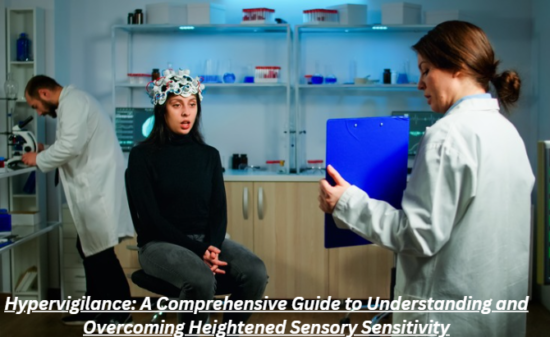Hypervigilance is a multifaceted psychological national characterized by a dangerous state of sensory compassion and constant attentiveness. This condition energies beyond typical consciousness, creating a perpetual intelligence of potential hazards that can significantly influence an individual’s mental well-being, relationships, and general quality of life.
Keywords: hypervigilance sense, pardon is hypervigilance, understanding hypervigilance
Pardon, Precisely is Hypervigilance?
At its core, hypervigilance signifies an enhanced national of sensory compassion where persons remain continually on high alert, forestalling potential intimidations even in harmless environments. This heightened awareness stems from the brain’s survival mechanism, often triggered by historical traumatic knowledge that disorders the nervous scheme to remain in a tenacious fight-or-flight style.

Read more:10 Natural Remedies to Combat the Sniffles and Feel Better Fast
The Neurological Basics of Hypervigilance
Brain Chemistry and Stress Reply
Hypervigilance is deeply rooted in our nervous framework. Once an individual acknowledges trauma or prolonged stress, the brain’s amygdala—responsible for processing feelings and threat detection—becomes agitated. This neurological version principles to:
- Augmented cortisol production
- Enhanced sympathetic anxious system start
- Persistent national heightened stimulation
Keywords: hypervigilance causes, the nervous basis of hypervigilance, shock, and brain interaction
Comprehensive Causes of Hypervigilance
Primary Triggers of Hypervigilance
Traumatic Experiences
- Survivors of physical or emotional abuse
- Combat veterans
- Individuals who have experienced severe accidents
- Victims of violent crimes
Mental Health Disorders
- Post-Traumatic Stress Disorder (PTSD)
- Generalized Anxiety Disorder
- Panic Disorder
- Complex anxiety spectrum conditions
Neurological and Developmental Conditions
- Attention Deficit Hyperactivity Disorder (ADHD)
- Autism Spectrum Disorder
- Sensory Processing Disorders
Substance-Related Factors
- Prolonged substance abuse
- Withdrawal symptoms
- Neurochemical imbalances caused by drug use
Keywords: hypervigilance triggers, causes of heightened awareness, trauma-induced sensitivity
Recognizing Hypervigilance: Symptoms and Manifestations
Physical Symptoms
Hypervigilance manifests through various physical indicators that closely resemble acute anxiety symptoms:
- Rapid, irregular heartbeat
- Excessive sweating
- Muscle tension and chronic fatigue
- Persistent insomnia
- Exaggerated startle response
- Rapid, shallow breathing
Psychological and Emotional Indicators
The psychological landscape of hypervigilance includes:
- The constant underlying sense of fear
- Chronic irritability
- Difficulty concentrating
- Persistent intrusive thoughts
- Emotional numbness
- Tendency to avoid unpredictable social situations
Keywords: hypervigilance symptoms, physical signs of heightened awareness, emotional impact of hypervigilance
Impact on Daily Life and Relationships
Personal and Professional Consequences
Hypervigilance can create significant disruptions across multiple life domains:
- Reduced workplace productivity
- Challenges in maintaining professional relationships
- Increased risk of burnout
- Social isolation
- Compromised decision-making capabilities
Relationship Dynamics
The condition profoundly affects personal relationships by:
- Creating communication barriers
- Generating misunderstandings
- Leading to emotional distancing
- Causing potential conflict due to misinterpreted interactions
Keywords: hypervigilance relationship challenges, social impact of heightened sensitivity
Effective Management Strategies
Professional Therapeutic Approaches
Cognitive Behavioral Therapy (CBT)
- Restructuring thought patterns
- Developing coping mechanisms
- Challenging irrational beliefs
Eye Movement Desensitization and Reprocessing (EMDR)
- Processing traumatic memories
- Reducing emotional reactivity
- Restoring neurological balance
Exposure Therapy
- Gradual desensitization to triggering stimuli
- Building emotional resilience
- Controlled confrontation of fear responses
Lifestyle and Holistic Interventions
- Regular physical exercise
- Mindfulness meditation
- Balanced nutrition
- Consistent sleep hygiene
- Stress reduction techniques
- Limiting caffeine and stimulant intake
Keywords: hypervigilance treatment, managing heightened awareness, holistic healing approaches
When to Seek Professional Help
Warning Signs Requiring Intervention
Immediate professional consultation is recommended when:
- Daily functioning becomes significantly impaired
- Relationship conflicts become chronic
- Self-destructive coping mechanisms emerge
- Persistent feelings of fear overwhelm daily experiences
Treatment Options
- Individual psychotherapy
- Group counseling
- Medication management
- Integrated treatment programs
Keywords: hypervigilance therapy, professional help for heightened sensitivity, treatment options
Conclusion: Hope and Healing
Hypervigilance, while stimulating, is not an insuperable condition. With proper kind, professional support and committed work, individuals can mature effective managing policies and gradually restore a sense of safety and emotional stability.
Frequently Asked Questions
Can hypervigilance be wholly cured?
While not always “curable” in the outdated sense, it can be successfully managed and meaningfully reduced through comprehensive treatment tactics.
How extensive does hypervigilance conduct typically take?
Treatment duration varies depending on discrete circumstances, vacillating from several months to manifold years.
Are there natural medications for the management of hypervigilance?
Techniques like meditation, regular exercise, and preserving a structured lifestyle can assistance manage symptoms.
Keywords: hypervigilance FAQs, handling heightened awareness, retrieval strategies
